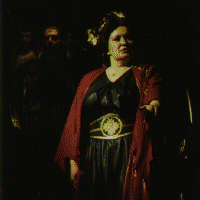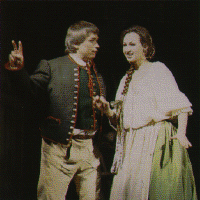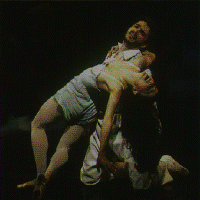
Bedrich Smetana: Libuse
- The libreto of this festive opera was written by Josef Wenzig. It is based on a passage from
so-called Rukopis Zelenohorsky (the Green-Mountain Manuscript), describing
the scene of judgment given by the Czech princess Libuse. The plot has been built on the conflict
between the brothers Chrudos and Stahlav concerning their father's inheritance. Princess Libuse
passes her judgment, but Chrudos rejects it and demands that men rule and decide instead of women.
Chrudos's offensive behavior forces Libuse to marry and to pass her authority and power to
a male ruler. She selects Premysl, who accepts her offer and leaves his native village of Stadlice
in order to become a chief ruler. Libuse welcomes her husband into her princely palace and foretells a glorious future
for her nation. The entire work culminates in a monumental prophecy scene: "My Dear Czech nation will not perish!", prophesies the
princess. The national and artistic significance of Libuse make this opera truly exceptional.

Bedrich Smetana: Prodana nevesta (The Bartered Bride)
- Bedrich Smetana: Hubicka (The Kiss)
- Antonin Dvorak: Rusalka

Antonin Dvorak: Cert a Kaca (The Devill and Kate)
- Antonin Dvorak: Jakobin (The Jacobin)
- Leos Janacek: Kata Kabanova (Katya Kabanova)

Charles Gound: Romeo et Juliette
- Giacomo Puccini: La Boheme

Pyotr Ilyich Tchikovsky: Swan Lake
- Sergey Prokofiev: Cinderella
- Giuseppe Verdi: Don Carlos
- Pyotr Ilyich Tchaikovsky: Eugene Onegin
- Giuseppe Verdi: La Forza Del Destino (The Force of Destiny)
- Pietro Mascagni: Cavalleria Rusticana, Ruggiero Leoncavallo: Pagliacci
- Wolfang Amadeus Mozart: Don Giovanni
- Wolfang Amadeus Mozart: Kouzelna fletna (The Magic Flute)
- Wolfang Amadeus Mozart: Le Nozze di Figaro (The Marriage of Figaro)
- Leos Janacek: Prihody lisky Bystrousky (The Cunning Little Vixen)
- Giuseppe Verdi: Rigoletto
- Giacomo Puccini: Il Trittico (The Trilogy)
- Bedrich Smetana: Dve vdovy (Two Widows)







